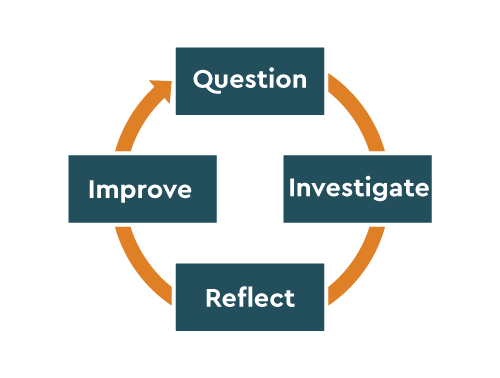Evaluation is an extremely helpful addition to any strategic, planning, or development process, but it is often left out due to time or money constraints. Not all evaluation processes, however, come at a high cost: Team-Based Inquiry could be a user-friendly way for your team or organization to incorporate evaluation into its development and planning cycles.
Team-Based Inquiry empowers professionals to get the data they need, when they need it, to improve their products and practices and create successful program experiences. Download the free TBI Guide.
Developed as a real-time reflection process for non-evaluators, TBI is meant to help teams of all kinds think about their endeavor using an evaluative frame of mind. As a co-developer of the Team-Based Inquiry (TBI) process in 2012, I’ve seen clients use and adapt it for program, strategic, organizational, educational, exhibit, and professional development planning. The process brings together a team to identify and prioritize their Questions about the project, Investigate those questions by collecting relevant information, Reflect on how/whether the information answers the questions, and take action to Improve their next steps.
The TBI Cycle
Question: This is usually – but not necessarily – the best place for teams to start. Most find that the process of coming together, clarifying the scope of the endeavor and identifying limitations (time, finances, or skills) sets the stage for productive brainstorming and prioritizing of questions. What do you need to know, figure out, or consider before making a decision, developing a product, or improving something? These overarching questions guide your whole process and can only be answered through your team’s data collection process.
Investigate: With your big TBI questions in hand, you can see which data should be collected and identify the best methods for doing so (and from whom). Your team develops the data collection instruments. You might use questionnaires, interviews, or observations or consider other, more interactive or unique data collection processes to find the information and make the experience more fun.
Reflect: Enter the data into Excel, Word, Google Docs, or whatever works best for collating the data and making it accessible for all team members. Don’t forget to keep the information confidential and safe! As a team, review the information, discuss surprises or elements that raise questions and then identify the patterns and themes that answer your TBI Questions.
Improve: After reviewing the data and discussing the patterns, your team has probably already started identifying possible directions and actions. Take time to fully brainstorm potential solutions, decisions, or action steps based on how the data answers your questions. Next, prioritize these possible action steps or solutions, considering your time and resource constraints, and assign the work steps to achieve your resolutions. Don’t forget to write a brief narrative of your experience so you can share it beyond your immediate team.
Updates on TBI’s Development
TBI was originally developed in 2012 for a 10-year National Science Foundation project, the NISE Network, which needed to find a way to evaluate all of the programs, trainings, and exhibits the network was rapidly developing, modifying, and producing. The evaluation and leadership teams developed tools and trainings to support informal science education professionals in incorporating evaluation and data-based decision making into their work: the Team-Based Inquiry process was born.
Since those initial guides, videos, and tools were created, numerous workshops, presentations, and professional development cohorts have helped bring the TBI process to the broader museum field. But, TBI is not just for museum practitioners! Evaluation is a process that can help all types of teams, regardless of content, goal, or context. Partnering with the Hubert Project at the University of Minnesota’s Humphrey School, I have created a TBI resource for nonprofits available for free at the Hubert Project’s website.
I caught up recently with Bridget Devlin at the Peabody Essex Museum, a former TBI training client, and I was excited to hear about all that PEM has been up to with evaluation!
We have been encouraging a more reflective practice across teams and are utilizing TBI strategies on exhibition planning teams and within our department. I have also expanded our evaluation team from 1/2 of me to include 3 part time staff members.
Your support and encouragement as we set out to build our strategic approach to evaluation was invaluable to our team.
